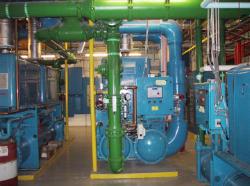Advantages and Applications of Combined Heat and Power
CHP is well-suited to facilities with higher thermal loads, consistent electric and thermal energy requirements, and round-the-clock operations.
Campus institutions, such as universities and hospitals, often benefit from aggregating energy needs in a district energy CHP system. Advances in reciprocating engines and smaller combustion turbines with capacities starting at 25kW now make it feasible for smaller, single-building users to take advantage of CHP technology.
A variety of approaches to system design have evolved, including firms that can provide design and build services, independent builder/owner/operators, and vendors who offer comprehensive energy supply and services.

Combined Heat and Power offers these important advantages:
CHP systems improve energy efficiency and reduce energy costs.
- Total system efficiencies of 75% to 85%
- Cuts energy costs by as much as 40%
- Produces power at rates lower than electric utility
- Reduces peak electric energy costs and demand charges
- Recovers and turns heat lost during power generation into usable thermal energy
- Simple paybacks on investment as little as 2 to 3 years
- Helps contribute to U.S. economic growth through more efficient use of resources and capital
CHP systems help the environment.
- Significantly reduces emissions of NOx, SOx and CO2
- Helps business meet mandated air pollution limits
- More efficiently and economically prevents, rather than treating, polluting emissions
CHP systems enhance power reliability and quality.
- Reduces vulnerability to power outages
- Reduces or eliminates dependence on electric utility
- Ratio of electrical and thermal energy can be easily varied
CHP systems are right for many facilities.
- Designs options range from large district energy systems for multi-building complexes to 25kW packaged systems for smaller buildings
- Well-suited to high thermal loads and consistent electrical/thermal needs
- System components can be optimized to users needs from a variety of technologically advanced equipment choices
